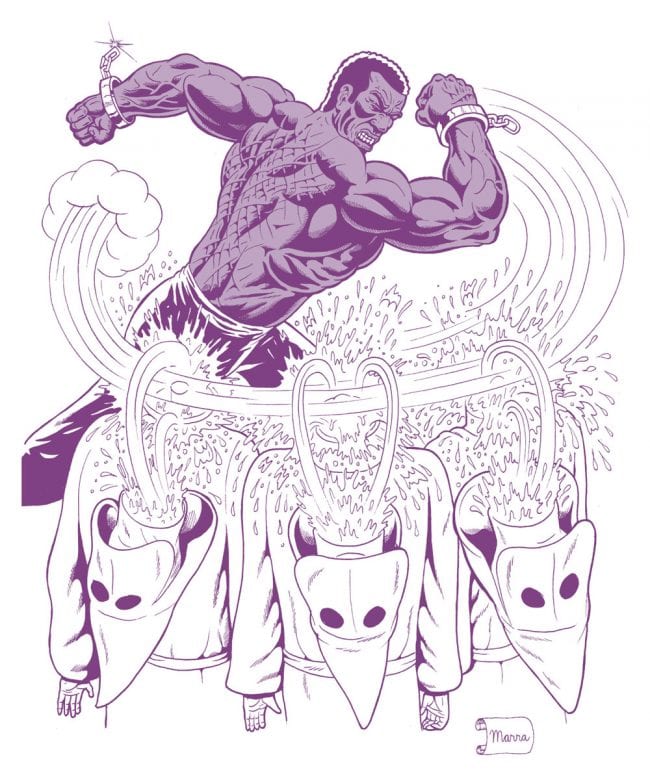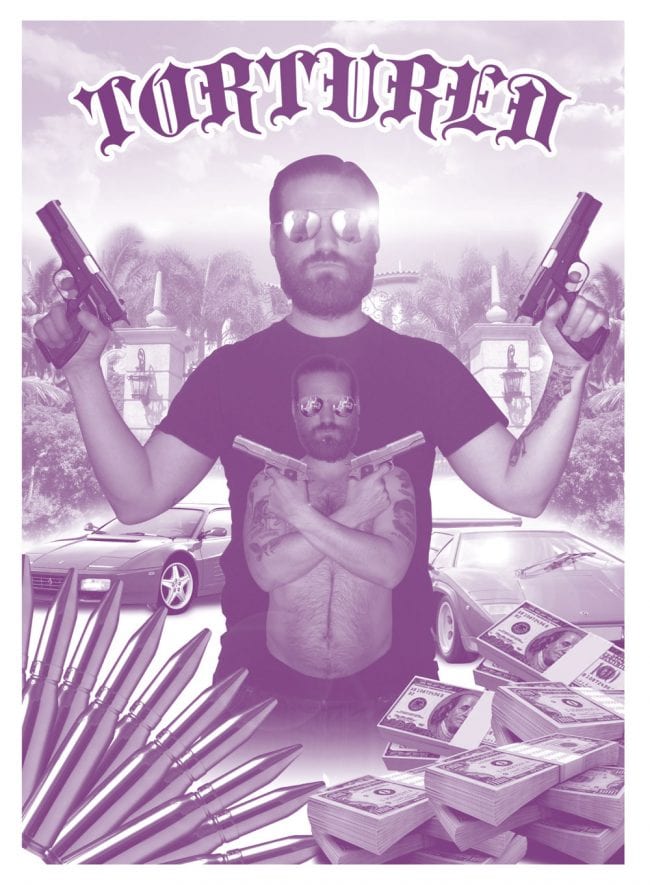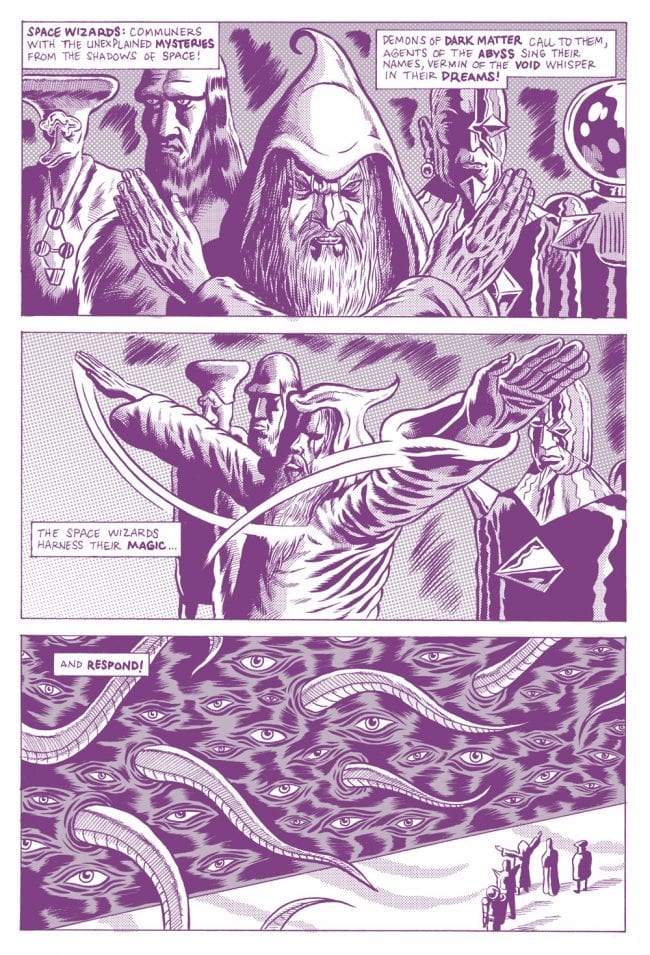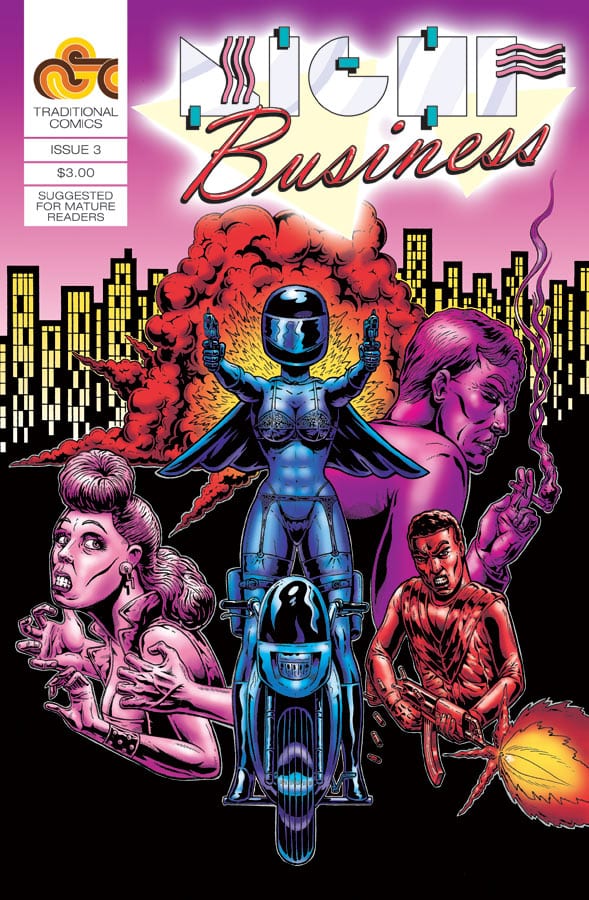So, I just wanted to start this off by saying that I am a huge Benjamin Marra fan. I’ve been following his work for years - finding him first, on the now antiquated site Flickr, just before he started his own publishing imprint, Traditional Comics.
When I first saw his moleskin drawings I was blown away… The drawings were how I wished I could draw. Slick, tuff, and beautiful… I’d never seen work that distilled cool into single images so perfectly. The work was an immediate fascination for me. I was hooked and I wanted more.
Luckily, he’s prolific as fuck and since those early images online, I’ve watched as he’s forcibly taken over the comics landscape with the pure insanity of his skills, which have grown sharper and more refined thru his series of black and white, wildly creative and lurid self-published epics; all of which lead him to the Magnum Opus, Terror Assaulter: OMWOT which was released by Fantagraphics last year. He’s easily become one of my favorite creators working and is also just a genuinely good dude and friend.
Now his newest book, American Blood, (his second book with Fantagraphics) collects those wildly creative self-published B&W comics into one densely packed tome of visceral joy and violent glee!! I’m psyched for the chance to talk to Mr. Marra and ask him a few questions about his work. Lets dive in.
American Blood. Good title. What does it mean to you?
Ata, who runs Autsider Comics, my publisher in Spain, came up with the title. He wanted to publish a collection of my work in Spain and called the book Sangre Americana. I sent it to Fantagraphics and we basically did the same book and we kept the title as an English translation. Ata designed both logos for both books. He's an excellent designer. I thought it was an appropriate title for a foreign translation of my stuff and the name just stuck. My work usually explores themes of America: sex, violence, race, gender. And one day: football and religion, which might be the same subject.
Violence is a key theme in a lot of your work. You use it in various ways from satirically, to perfectly timed comedic beats, and then sometimes seemingly just for bad-ass-ness. What role does violence play for you in your work? Why is it necessary in your narratives?
I get asked this question a lot. I'm not exactly sure why violence takes center stage in my work. It could be because of the genres that influence me directly: action movies, crime fiction, film noir, exploitation movies. I think it also may go back to the earliest times when I was drawing. When I was very young I believed there were things I was not allowed to draw, including violence. I read Darick Robertson's black-and-white 1980s comic, Space Beaver, when I was a kid and there was a pin-up in the book of Space Beaver standing over a wolf guard he slaughtered with a knife. The pin-up was titled "Bloodlust" and Beaver was covered with his enemy's blood, dripping down from his chest fur. I never forgot that image. It scared me as a kid. As a kid I was desperately afraid of violent acts. I think I may have started to draw violence as a way to have power over my fear of it.
Sex is also a key component to a lot of your work and just like your use of violence, you use it to various effects from sexy renderings of the human form, to titillating hardcore pounding, to the absurdly awkward, verging on disturbing… Is it a send-up of the genres you’re satirizing or are you trying to say more with these depictions of sex?
Yes, it is a send-up of the way sex is handled in genre and American visual storytelling. It makes me think about the power images hold. If my work were prose and I were writing about sex I don't think it would get the same kind of attention, but because the sex is depicted it somehow becomes more significant. I think sex is a very human act but for some reason it's largely missing from a lot of visual stories in the U.S. In television that appears to be changing. Television is a lot more daring these days with the themes it explores. It's obvious to state, but in many feature films graphic violence is accepted where sex is not. One theme is about the destruction of life, what tears us apart as humans. The other is about creation, feeling alive, and what we share as humans. It's strange, but also a very human fault to be obsessed with doom rather than salvation.  Another aspect of your work I appreciate and what I feel that gives it such power is the level of absurdism you play with. From the depictions of over the top violence to the stunted narration & dialogue, and protagonists whom wear their motivations/emotions on their sleeves, you seem to be making fun of reality at all times. What is it about life that you find so absurd?
Another aspect of your work I appreciate and what I feel that gives it such power is the level of absurdism you play with. From the depictions of over the top violence to the stunted narration & dialogue, and protagonists whom wear their motivations/emotions on their sleeves, you seem to be making fun of reality at all times. What is it about life that you find so absurd?
Perhaps all of it. Especially living in the U.S. and then living outside the U.S. and seeing it from a new perspective. The mere fact that we exist is pretty strange to me. Sometimes even looking at the design of the human form is absurd to me.

Sometimes lost in the sex, violence, and absurd nature of your work is the fact that your comics are genuinely funny and sometimes outright hilarious. How does humor play a role in your work?
Humor is a byproduct of the stories I tell. I don't know where it comes from. It's never been a specific intent for me. But I guess it's a part of my storytelling instincts of what I feel works. I want to tell serious stories sometimes and when I try, the result is humor. I've just accepted it as part of my vision.
You seem very preoccupied with power and masculinity: the physical form of your muscular protagonists and their trails of strength or in terms of how it’s wielded by those in control (evil dog catchers, lizard men overlords, and crooked government officials). You play with the archetypes of masculinity, both inflating it as well as inverting it. What is it about being a man you’re trying to say with these depictions of strength and power? Does this come from your need to assume a form of power of your own thru the making of your comics?
Initially when I started making comics it was a reaction to the comics that were coming out at the time. I wasn't into the portrayal of male heroes in mainstream comics. They all seemed burdened with doubt and despair. I felt like this was inconsistent with how heroes should behave. I chalked it up to writers attempting to inject depth into their male heroes by giving them a new dimension of sadness and self-doubt. It was too obvious of a creative choice to me. I understand comic writers are under punishing deadlines, but to me it was a lazy choice. On the other side, independent comics I was seeing a lot of sad-sack neuroses in male characters. It was a celebration of being a spineless, self-obsessed, wimp, or of anti-masculinity. I felt there could be an alternative to how male characters could be portrayed in comics. So it started as a motivation to do something different. Something I felt wasn't occurring in comics at the time. It seems to have become an exploration into what it means to be a man.
I feel you have that rare ability to make comics that are enjoyable at face value as a visceral explosion of graphic ability, while also having a real depth of meaning, often verging on satire. I feel like you’re saying something with each of your comics without allowing the message to get in the way of the comic itself. Is this something you strive for, this dichotomy of idea? Or is it just a natural development from how you create your work?
It's a natural development. My first and only real intention is to tell a story that works. Story is my biggest priority. It's might be my only priority. All other decisions or intentions are secondary. But I think each of the comics I make are also about what comics are as a medium. They're a declaration of what comics should be, or maybe just evidence of what they could be, what power they can hold. When I make comics or develop stories I try to access parts of my imagination that are pure and raw. It's similar to my drawing approaches. I try to be as decisive as possible with my choices and preserve unfiltered moments of creative energy. I think that leads to more inherently personal work that is more meaningful. At the same time, the content of my work is very basic. I'm inspired by things lacking depth, like action movies, pulp science fiction novels, or TV shows like Walker: Texas Ranger.
I consider you a subversive artist because of this. Because you do “sneak” in deeper issues into your work. Do you consider what you do to be subversive? Do you think everyone gets it? Does it matter if they don’t?
I can understand why the work would be considered subversive. It wasn't a conscious intention when I started making comics or continues to be. It's sort of like the humor in the work. It's not important to me if people get it. I'm surprised when readers connect with my work.
You have such a strong and confident creative voice. Do you ever suffer from self-doubt while working? Do you ever question whether what you’re creating is too out there and might miss the mark??
I don't suffer from self-doubt. The work I make is a product of training myself to eradicate self-doubt. What is difficult a difficult challenge is perfecting my process when it comes to drawing. That is always going to be an eternal struggle. I don't really question whether what I'm working on is too out there and I think I miss the mark constantly. The results of missing the mark is what could be called my style.
Do you think of an audience while creating? Do you think that is necessary to creating good work or do you let your inner voice “and the stars” guide you?
I don't think of the audience when I'm creating content. But I do think about the reader when I'm considering formal storytelling choices. It's sort of like if I were a prose writer, I'm not thinking about the audience with regard to the meaning of a sentence. But I want the sentence to make sense and be clear. I think it's necessary not to consider the audience to make good work. It's important to listen to what guides you from within. If you let an illusory external audience dictate creative choice, you're not making art.
A small minority of loud people online have come out questioning whether a white artist should be creating works of fiction in a “black” world. And that a white man parodying the rap world (Gangsta Rap Posse) or telling the story of an American slave (Lincoln Washington) is inherently racist. What are your thoughts on such criticism?
I don't think too much about criticism. If you make things there will always be a portion of the audience who disagree with it. When I started making comics I never thought anyone would read them. There's a ton of content out there and I'm thankful if anyone chooses to read my stuff. If people start talking about it then that's even better. And if there's a conversation about the work I make, then there are going to be multiple perspectives. I have a compulsion to make comics. It's up to the readers to discuss them. It's not my place.
You wear your love of D&D, fantasy adventure and barbaric protagonists on your sleeve, making several comics within that sort of world (Orion, Blades and Lazers, Naked Heroes). Does this go back to adolescent fixations? What is it about monsters, magic, power stats, and manly mayhem you love so?
It goes back to reclaiming something I didn't experience as a kid. I didn't play D&D or other RPGs much as a kid. For one, I didn't know anyone older than me who knew enough about the game to run it. Secondly, my mom sort of believed in the whole Satanic Panic back in the '80s and thought D&D would turn me into a devil worshiper. The art, as with comics, in early D&D is what pulled me in. The fact that I couldn't play it made it that much more mysterious. I started playing and running RPGs about a decade ago and have multiple games going at once. What I enjoy about it is the cooperative, improvisational group storytelling form as well as the genre and tone of the games themselves. There's nothing else that ignites my imagination the same way.
Rereading your The Incredibly Fantastic Adventures of Maureen Dowd I found it played with similar ideas as OMWOT. Government conspiracies, over the top sexualization and uber violence in the name of America, all seem to be there, just representing opposing sides of the coin. Was that comic the seed from which Terror Assaulter grew from? Or am I waaay off base?
The Maureen Dowd comic definitely wasn't what I was thinking of when I conceived Terror Assaulter. But you're right on; they do share a lot of themes and ideas despite being very different comics. When I made The Incredible Fantastic Adventures of Maureen Dowd. I'd been reading a lot of Vince Flynn books and those had a big influence. Terror Assaulter was more inspired by movies, witnessing 9/11 and the decade of NeoCon foreign policy that followed, and conspiracy theories I'd been exposed to.
 You’ve worked with a lot of musicians over the years doing record covers and posters as well as a comic for the New York band, Naked Heroes. You also have used music in your comics (which is very hard) in extremely gratifying ways, like the rhymes Gangsta Rap Posse kick and the Ripper and Friends theme song (all of which I feel should be recorded at some point). What role does music play in your work? Is it a major influence on you creatively?
You’ve worked with a lot of musicians over the years doing record covers and posters as well as a comic for the New York band, Naked Heroes. You also have used music in your comics (which is very hard) in extremely gratifying ways, like the rhymes Gangsta Rap Posse kick and the Ripper and Friends theme song (all of which I feel should be recorded at some point). What role does music play in your work? Is it a major influence on you creatively?
I love music, but I don't listen to it much. I put it in my comics when the story demands it, but I don't actively try to weave it into my work. Music isn't a huge influence on me creatively. However, music does offer a wonderful opportunity and canvas for illustration. I really enjoy working on album covers. When it's working it feels great.
I am openly jealous of your fashion sense and your ability to look good even as a Centaur. You’ve played with your “image” throughout the years, having posed for several amazing “artist/author” photos with many of your books and I was very happy to see these collected in American Blood also. Too many cartoonists take themselves too seriously. Is it important to you to take a piss like that and not take yourself so seriously?
Yeah, it's important to me not to take anything too seriously. When I did take art very seriously I found myself creating mental walls that I eventually had to knock down. I found myself creatively paralyzed and a perfectionist. I'm very serious about not taking things too seriously.
This is your second book with Fantagraphics, what has it been like working with them? Was this a relationship you sought after? Do you have plans to continue working with them?
It's been a dream working with Fantagraphics. It's not something I sought after. Working with Fantagraphics happened pretty organically over a few years. I do have plans to continue work with them. I'm working on my next book for them currently. I hope to have a large library of books with them in the near future.
What are some of your favorite comics happening right now? Who are some artists you’d like to shine a light on that your audience might dig?
I mostly mine the comics of the past, so I don't know about too much that's going on these days. But I did love Wendy by Walter Scott. The next volume is due out next month if I'm not mistaken. Artists who's work continually blows my mind are Ken Landgraf, as well as his collaborator John Jacobs, and Lawrence Hubbard, who's Real Deal collection just came out. I saw some of Lawrence's originals over the summer and I think seeing them in person forever changed me as an artist.
Do you have any dream projects (however unlikely) involving other people’s characters or properties?
For example I want to write a series of Troma comics involving several of their properties that various artists would then draw. Is there anything out there you wish you could get yer hands on?
Not really. It would be fun to work on Jim Valentino-era Guardians of the Galaxy book, but I'd rather work on my own stories. I've got a queue of them in my brain and they all need to get out. I'd rather realize my visions than help someone else realize theirs.
What’s next for Benjamin Marra?
Night Business. I'm finishing the series right now as a single, complete, 10-chapter volume. It's due out next fall.
One last question… What is best in life?
Obviously, "to crush your enemies, to see them driven before you, and to hear the lamentations of their women," as Conan said. There is no other answer.


















